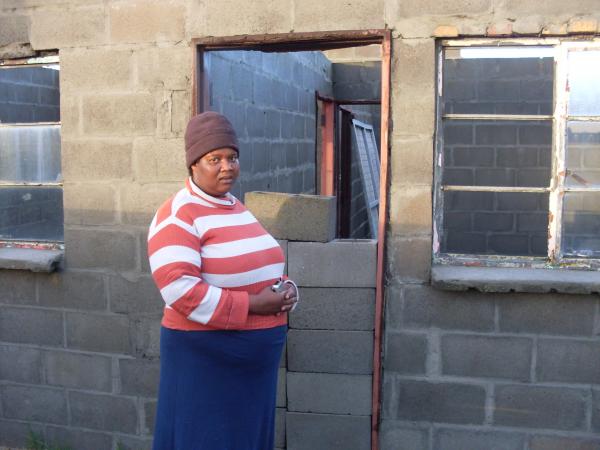Nyanga housing delays anger residents

“Every time we think we are getting somewhere, we just go right back to square one.” These are the words of Thembisa Maso, a KTC resident and mother of three who has been waiting for her house to be completed.
Maso is one of 57 residents who is part of the Masizakhe People’s Housing Process (PHP) project. The residents say their houses were left unfinished in 2001.
“We want to know what is happening with the project. I live behind my unfinished house in a shack with two of my children. I had to send my other child to live with my sister because we suffer in this shack during winter when it rains,” Maso said.
She said she was part of the project which was approved in 2001. Two hundred and fourteen houses were supposed to be built in total but more than 50 houses were left unfinished. Some residents finished the houses themselves with their own money.
The houses, situated in the Nyanga area, are hollow structures made with grey bricks, with frames for the doors and windows, and no roof.
“We have been back and forth to the Department of Human Settlements. We are either chased away or told the same thing, that the matter will be investigated. In 2008 someone came to check the houses and photographs were even taken of the structures, but nothing came of that. We are tired of this running around. We just want to know what is going on and when our houses will be finished,” explained a visibly angry and frustrated Maso.
Agnes Fuma, 65, who is also one of the project’s beneficiaries, said the only thing she was provided with from the project was sand and building bricks.
“I built the actual house myself. I got someone whom I paid to build my house for me, from the roof to the windows and doors. It was all me,” said Fuma.
Bruce Oom, spokesperson for the Western Cape MEC for Human Settlements, Bonginkosi Madikizela, said the houses were left unfinished by the contractor responsible at the time.
“The intention of the original PHP projects was that the community would be empowered by taking a role in appointing and managing the contractors. However, this led to some problems with service delivery. The Department now takes a more hands-on role in appointing and managing contractors,” explained Oom.
Oom said subsidies for the project were paid out to the accounts administrator (which was the City of Cape Town), yet due to the contractor leaving the work unfinished, not all the money in the project was paid out by the City.
Oom continued, “The City has subsequently repaid the unspent funds to the Department. The Department is currently assessing the outstanding work needed on the site, and identifying the costs needed to complete the units, so that the people who most need houses can get them. Once the current assessment is completed, the Department will then be in a position to revise the subsidy and reissue it so that the units can be completed.”
He said the assessment could likely take several months or longer because after it there would need to be a tender process to appoint a contractor.
Support independent journalism
Donate using Payfast

Don't miss out on the latest news
We respect your privacy, and promise we won't spam you.
Next: Controversy over Jooste Hospital closure
Previous: Refugees welcome to join trade unions, says COSATU

This article is licensed under a Creative Commons Attribution-NoDerivatives 4.0 International License.
